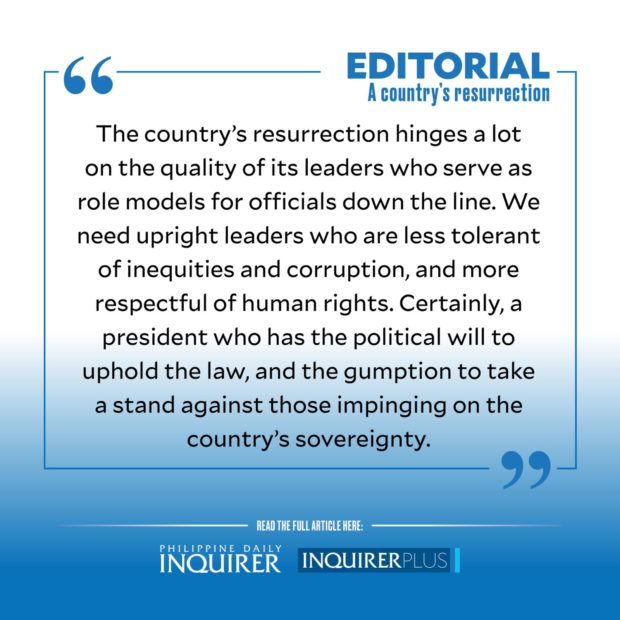
In his previous Easter messages, Pope Francis spoke of Jesus who was crucified, but is now risen, in accordance with the Scriptures, and just as he had foretold to his disciples.
But Christ’s glorious resurrection is not without pain, the Holy Father added. “The risen Jesus bears the marks of the wounds in his hands, feet and side,” he said, describing what the Catholic Church has often preached about sacrifice presaging salvation. Similarly, those who have experienced “a painful trial in body or spirit can find refuge in [their] wounds and, through them, receive the grace of the hope that does not disappoint,” Pope Francis told the faithful.
The Pope might well be speaking of the country’s tribulations in recent years. Amid a crippling pandemic that has afflicted the world, the Philippines saw its gross domestic product shrink 9.5 percent in 2020, the worst since 1947.
One of the world’s longest and most restrictive lockdown has cost thousands of jobs, leaving 4 million Filipinos jobless in January 2021. Students and the education sector have suffered as well, as the country was ill-prepared for the abrupt but necessary shift to online classes. A recent report by Unicef found that three out of 20 Filipino students can hardly read simple texts as the quality of learning deteriorated for lack of access to gadgets and reliable telecom services. And while drug-related extrajudicial killings have tapered off somewhat, the drug menace remains resurgent, as evidenced by recent police raids that have netted billions of pesos in illegal drug hauls. Even as the pandemic eases, new strains of the virus continue to be a huge health concern as the country’s vaccination target of 70 percent has yet to be met. As critics raise their voices demanding change and accountability, they are first Red-tagged and then arrested without warrants, or mowed down by agents of the state.
Yet as the country undergoes its own crucifixion, so does a resurrection beckon just three weeks away. With people voting according to their conscience, the May 9 elections could easily result in a reboot, an Easter of sorts for the Philippines. What a chance to start over and redeem the country’s complicated and fractured history, while weeding out its revisionist versions!
But just as Thomas the apostle expressed doubt at the news that Jesus had risen from the dead, the prospect of rebuilding a fragmented country has often been met with reservation and incredulity. The gargantuan task may sound too ambitious a dream, an ideal divorced from reality.
The new government that would be elected on May 9 certainly has its work cut out for it. Dealing with the pandemic and its many possible strains may be a good start. Instead of sanctions and coercion, it can offer incentives and more access to health information for anti-vaxxers, while seniors, persons with disabilities, and others so encumbered can be assisted to get to and from vaccination centers. With the Mandanas ruling taking effect and more funds coming to them, local government units may now have the means to procure refrigerated units for more vaccines and the means to transport them to the remotest barangays. These efforts would result in a healthier, more mobile population that could definitely help jumpstart the sluggish economy.
Just as deserving of government attention are farmers, who have seen their crops rot for want of cool storage facilities, and the unfair competition offered by cheaper, smuggled vegetables.
For sure, the problems confronting the next administration may be daunting: how to create more decent-paying jobs to make our workers stay; how to pay for the loans incurred by the current administration—a record-breaking P12.03 trillion so far; how to clean up government agencies plagued by corruption; how to ensure a working criminal justice system that punishes abusive law enforcers and court officials as well; how to make climate resiliency and renewable energy part of every agency’s strategy for sustainable change.
Still and all, the country’s resurrection hinges a lot on the quality of its leaders who serve as role models for officials down the line. We need upright leaders who are less tolerant of inequities and corruption, and more respectful of human rights. Certainly, a president who has the political will to uphold the law, and the gumption to take a stand against those impinging on the country’s sovereignty. Definitely, one whose public pronouncements do not divide the nation nor embarrass us before the world.
As Pope Francis has said of Jesus’ resurrection, “Easter does not offer us a mirage or reveal a magic formula … [but allows us] to look to the future with confidence and hope.” As it should—but only if we make sure that the coming elections truly become an opportunity for the country’s rebirth.

